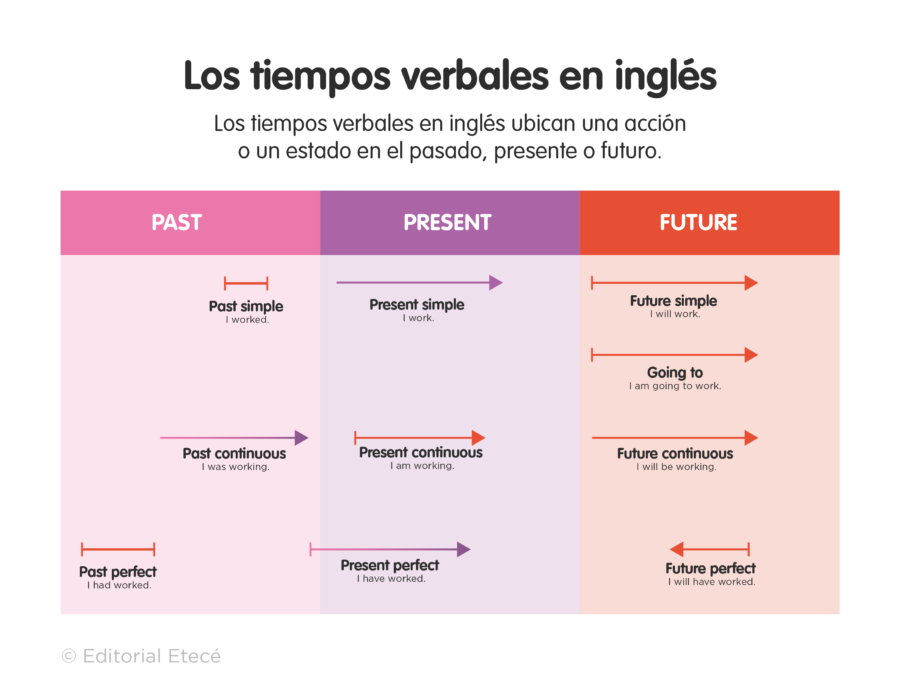Índice
Going to es una construcción que se utiliza junto al verbo to be y un verbo principal para formar el futuro going to (going to future), que es uno de los tiempos futuros en inglés. Significa “voy a …”, “ vas a …”, “va a …”. Por ejemplo: I’m going to watch a movie tonight. / Voy a ver una película esta noche.
Going to junto a was / were y un verbo principal forman el pasado del futuro going to, que se utiliza para expresar algo que se iba a hacer pero que no se hizo. Significa “iba a …”, “ibas a …”.. Por ejemplo: I was going to call you, but you called me first. / Yo iba a llamarte, pero tú me llamaste primero.
Gonna (contracción de going to) se utiliza en inglés informal, en el lenguaje oral, o en chats y mensajes muy informales. Por ejemplo: I’m gonna write to him. / Le voy a escribir.
Estructura afirmativa del futuro going to
El futuro going to tiene la siguiente estructura:
| Sujeto | to be (presente) | going to + verbo infinitivo |
|---|---|---|
| I | am (‘m) | going to read. |
| He She It |
is (‘s) | |
| You We They |
are (‘re) |
Por ejemplo: I’m going to do my homework later. / Voy a hacer mi tarea más tarde.
Estructura negativa del futuro going to
Para formar el negativo del futuro going to se niega el verbo to be:
| Sujeto | to be (negativo) | going to + verbo infinitivo |
|---|---|---|
| I | am not (‘m not) | going to read. |
| He She It |
is not (isn’t) | |
| You We They |
are not (aren’t) |
Por ejemplo: I’m not going to buy these pants. / No voy a comprar estos pantalones.
Estructura interrogativa del futuro going to
Para formar la forma interrogativa del futuro going to se invierte el orden entre el sujeto y el verbo to be:
| To be (presente) | Sujeto | going to + verbo infinitivo |
|---|---|---|
| Am | I | going to read? |
| Is | He She It |
|
| Are | You We They |
Por ejemplo: Are you going to call grandma? / ¿Vas a llamar a la abuela?
Usos del futuro going to
El futuro going to se utiliza para:
- Expresar un plan, una intención u objetivo, o una decisión hecha antes del momento en el que se está hablando. Por ejemplo: I’m going to be a vet when I grow up. / Voy a ser veterinario cuando sea grande.
- Expresar una predicción obvia, basada en un hecho evidente. Por ejemplo: It’s going to rain; look at those black clouds. / Va a llover; mira esos nubarrones negros.
Para tener en cuenta: No es usual encontrar going to seguido del verbo principal go. Se prefiere el uso del presente continuo. Por ejemplo: He’s going away next week. / Él se va a ir la semana que viene.

Ejemplos de oraciones con going to
- We’re going to play tennis next Saturday.
Nosotros vamos a jugar tenis el próximo sábado. - Madison is not going to buy that car.
Madison no va a comprar ese auto. - Are Alice and Ella going to stay in London for more than a week?
¿Alice y Ella se van a quedar en Londres por más de una semana? - Noah is going to wash the dishes after the party.
Noah va a lavar los platos después de la fiesta. - Wendy is going to visit a friend in the evening.
Wendy va a visitar a una amiga esta noche. - The company is going to increase sales this year.
La compañía va a aumentar sus ventas este año. - My parents are not going to travel in the summer.
Mis padres no van a viajar en el verano. - It’s going to be a beautiful day today; the sky is so blue!
Va a ser un día hermoso hoy; ¡el cielo está tan azul! - Are you going to publish your novel this year?
¿Vas a publicar tu novela este año? - Look at the sky; it’s going to rain soon.
Mira el cielo; va a llover pronto. - He is going to speak at the weekly meeting.
Él va a hablar en la reunión semanal. - Are you going to visit the pyramids while in Egypt?
¿Vas a visitar las pirámides mientras estés en Egipto? - Mel is going to see a play at the theater tonight.
Mel va a ver una obra en el teatro esta noche. - My mother is going to prepare some cookies for us.
Mi mamá nos va a preparar galletas. - Who is going to buy the ingredients we need for the recipe?
¿Quién va a comprar los ingredientes que necesitamos para la receta? - I’m not going to ask the boss for a salary raise.
No le voy a pedir aumento de salario al jefe. - Are your friends going to help us?
¿Tus amigos nos van a ayudar? - What are you going to do about it?
Qué vas a hacer al respecto? - Jack is going to prepare for the test.
Jack se va a preparar para el examen. - What is Willow going to study at university?
Qué va a estudiar Willow en la universidad? - She’s going to visit her family during her vacation.
Ella va a visitar a su familia durante sus vacaciones. - That book is going to fall; it’s on the edge of the table.
Ese libro se va a caer; está en el borde de la mesa. - I’m going to wash my hands.
Voy a lavarme las manos. - Jane is going to travel the world when she finishes university.
Jane va a viajar por el mundo cuando termine la universidad. - Mel is going to live on the West Coast of the USA.
Mel va a vivir en la costa oeste de Estados Unidos. - I still don’t know what clothes I’m going to wear for the party tonight.
Todavía no sé qué ropa voy a usar para la fiesta esta noche. - My father is going to change jobs.
Mi padre va a cambiar de trabajo. - What are we going to eat for lunch?
Qué vamos a comer para el almuerzo? - Sue is going to read a lot while on vacation.
Sue va a leer mucho durante sus vacaciones. - What are you going to give Julia for her birthday?
¿Qué le vas a regalar a Julia para su cumpleaños?
Ejemplos de oraciones con was / were going to
- I was going to enter the competition, but I got sick.
Iba a entrar en la competencia, pero me enfermé. - They were going to come to town, but there were no train tickets available.
Ellos iban a venir a la ciudad, pero no había boletos de tren disponibles. - Mary was going to visit us, but she couldn’t.
Mary iba a visitarnos pero no pudo. - Terry and Wendy were going to travel when the pandemic broke out.
Terry y Wendy iban a viajar cuando estalló la pandemia. - I was going to call my mother when she arrived.
Iba a llamar a mi madre cuando ella llegó. - We were going to work out outdoors when it started raining.
Íbamos a hacer ejercicio al aire libre cuando empezó a llover. - Bob was going to buy the tickets when he learned that the show had been canceled.
Bob iba a comprar los tickets cuando se enteró de que el show había sido cancelado. - Sarah was going to throw a big birthday party, but then she changed her mind.
Sarah iba a hacer una gran fiesta de cumpleaños, pero después cambió de idea. - Sharon was going to study medicine, but then she chose law.
Sharon iba a estudiar medicina, pero luego eligió leyes. - I was going to play tennis, but it was too cold.
Yo iba a jugar al tenis, pero hacía mucho frío.
¿Going to o will?
En algunos contextos, se puede usar tanto going to como will, en general con importantes diferencias, aunque otras veces la diferencia entre ambas construcciones es mínima o nula.
| Going to | Will |
|---|---|
| Decisiones hechas con anterioridad. I’m going to look for another job. Voy a buscar otro trabajo. | Decisiones hechas en el momento en el que se está hablando. I’ll come back in a minute. Volveré en un minuto. |
| Predicciones objetivas, basadas en hechos evidentes. The vase is on the edge of the shelf; it is going to fall. El jarrón está en el borde del estante; se va a caer. | Predicciones subjetivas, opiniones personales sobre el futuro. There will be some problems. Habrá algunos problemas. |
Atención: Con el verbo to be se utiliza tanto going to como will, sin diferencias de significado.
Sigue con:





¿Te fue útil esta información?
Sí No¡Genial! gracias por visitarnos :)